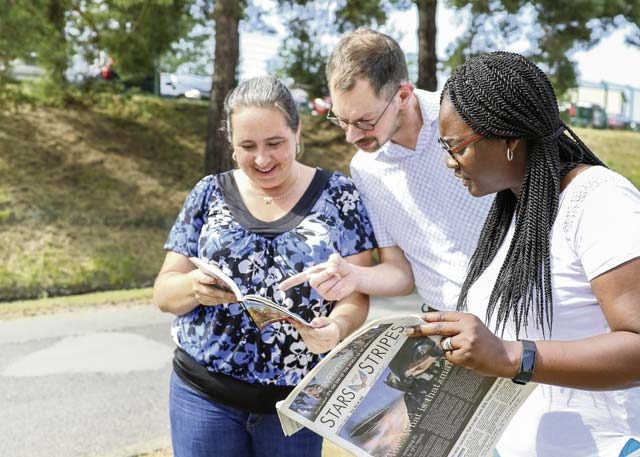Story and photo by Marcy Sanchez
Landstuhl Regional Medical Center

A long family relationship with the U.S. Forces drove Thomas Holzberger to seek employment at Landstuhl Regional Medical Center in the early 2000s. But it was a love for the hospital’s namesake that led him to offer Americans a crash course in German culture.
Holzberger can trace his family tree back 250 years when his ancestors migrated from nearby Austria. Although his family’s roots are interesting in itself, he hopes to arouse American curiosity and teach them about his town, region and country during their tours in Germany.
“My family has a real close relationship with the American Forces,” said Holzberger, whose father was a NATO Soldier and mother worked at LRMC for over 40 years. “My mom’s family is from (Landstuhl) and my dad’s family is originally from Austria, 250 years ago.”
As a child, Holzberger’s aunt, who worked at Landstuhl’s City Hall, roused his interest in history and his hometown. Today, he embodies the hospital’s motto of selfless service by paying it forward to American coworkers, who may be unprepared for German culture.
“(Holzberger) invited my spouse and me to go to some of his favorite restaurants with him and showed us some of his favorite menu items,” said Dr. James Rundell, a psychiatrist at LRMC’s Embedded Behavioral Health program.
Family ties to the U.S. also includes Holzberger’s great aunt, who worked at the nearby Vogelweh Commissary in the 1960s, and a brother who is currently employed by the U.S. Air Force. Holzberger himself has nearly two decades of employment with the U.S. Army and currently serves as a medical coder as part of LRMC’s Patient Administration Division. In this position, the Landstuhl native was introduced to multiple providers where he has extended an invitation to paint the town red.
“I like to teach people about (the region) because it’s a great place to live, and it’s really a rich history,” said Holzberger. “If people hear Landstuhl, they think the hospital outside of the U.S., but what’s behind it, they may not know.”
Justifying Holzberger’s passion, history shows Landstuhl having its earliest settlements 2,500 years ago during Celtic times, with continued occupation during Roman rule and into the present. Eventually the village transformed into a spa resort.
“Just the hospital’s history itself (is interesting),” said Holzberger, noting a few current structures were founded during the Third Reich and remain occupied today. “There are some details (Americans) may not notice right away, but they are (historical) sites.”
While Holzberger volunteers his free time to get Americans better acquainted with the region, he’s hopeful it will open their eyes to take in what’s around them and better prepare them for their tours.
“(Holzberger) taught us to use the train system, told us about his favorite shopping secrets and locations, and how get the lowest train fares for places we wanted to go,” said Rundell, currently on his third year in Germany. “We’ve actually remained friends since then. That ‘extra mile’ has significantly enhanced our experience of living in Germany.”
For Holzberger, going that “extra mile” is only part of being hospitable to his American coworkers, confident his personal tours will build bridges between Germans and Americans for the next generation.
“A lot of people get here, enjoy working here but want to get away (from Landstuhl),” said Holzberger. “I would like to interest people so they can get to know the area, get to know the people, let them experience what it’s like to live here, and not just be stationed here.”


